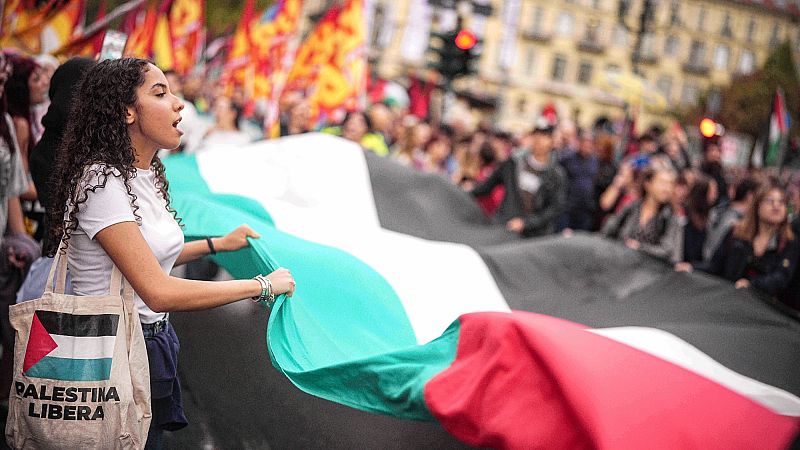Italy ready to recognise Palestine on two conditions, PM Meloni says

Italy's right-wing government is ready to recognise the state of Palestine, subject to conditions, after several other EU member states moved to do so this week.
Premier Giorgia Meloni announced on Tuesday evening that the parties forming her government will present a motion calling for Palestine's recognition in the Italian Parliament, subject to two conditions: release of the hostages taken by Hamas during its 7 October 2023 attacks and exclusion of Hamas from any involvement in a future Palestinian government.
"I am not against recognising Palestine, but we need to focus on the right priorities, Meloni said. The decision reflects those taken by Belgium and France, even in its conditions, and marks a significant change in Meloni's stance, which was at odds with Italian public sentiment and triggered a wave of protests in Italian cities.
Italians concerned about Gaza
A general strike took place on Monday across Italy involving around 500,000 people, in response to “the ongoing genocide in the Gaza Strip, the blockade of humanitarian aid by the Israeli army and the threats against the international Global Sumud Flotilla mission”, as a statement from the USB trade union federation stated.
Recognising Palestine was one of the requests coming from the so-called “pro-Pal Movement”, a group of civil society organisations, grassroots trade unions, and ad hoc citizens' associations.
It came together calling for more pressure to be put on Israel to stop the war, and a ban on the export of weapons and military components from Italy to Israel.
According to a recent survey, 40.6% of Italians favour recognising a fully sovereign Palestinian state, while 21.9% of the respondents preferred a temporary international administration to be put in place.
Another survey by the Italian project YouTrend highlighted Italians' wariness of Israel’s actions in the wake of the Hamas attacks of 7 October 2023.
Among respondents, 60% considered Israel “should withdraw from all the occupied territories in the West Bank”; 63% considered “it is committing a genocide in the Gaza Strip”; 64% believed that “it oppresses and systematically discriminates against the Palestinian people”, and 65% considered Israel's reactions to the Hamas attacks “disproportionate” and “mainly targeting innocent civilians”.
Giorgia Meloni's gradual shift on Palestine
According to YouTrend’s founding partner Lorenzo Pregliasco, the beginning of 2025 marked a turning point in Italian public opinion. Even the voters of political parties closer to Israel - like the right-wing Fratelli d’Italia or centre-right Forza Italia - started to express criticism against the Israeli government’s actions.
“I think that the extensive media coverage of the Gaza war, showing the humanitarian issues in the strip, has really touched people who did not have a strong opinion on the issue,” Pregliasco told Euronews in an interview.
In his opinion, this also provoked a gradual shift in Giorgia Meloni’s government’s position. “Of course, they do not want to have a radical approach, like the leftist parties have. But I noted a clear evolution, especially with recent strong criticism of the war, of the ground invasion of Gaza, of the humanitarian consequences of Israeli bombing,” he said.
Criticism of Israel and defence of Palestinians have long characterised Italian left-wing parties, but today Pregliasco sees less distance between the government’s and opposition’s stances on the issue.
Meloni still refuses to label Israeli military action in Gaza as "genocide", which the leftist parties generally do. But she has conceded on Palestine's recognition, following several months in which she declined to do so.
Just one day before Meloni's announcement, Italy’s Foreign Minister, Antonio Tajani, said that "a Palestinian State does not exist now, and therefore it cannot be recognised".
“Before recognising it, a state should be built up. We cannot make a gift to Hamas,” he told journalists on the sidelines of the UN General Assembly in New York.
While Italy has always been in favour of the “two-state solution”, Meloni's announcement represents a radical change, probably led by domestic public opinion on the topic.
Today

